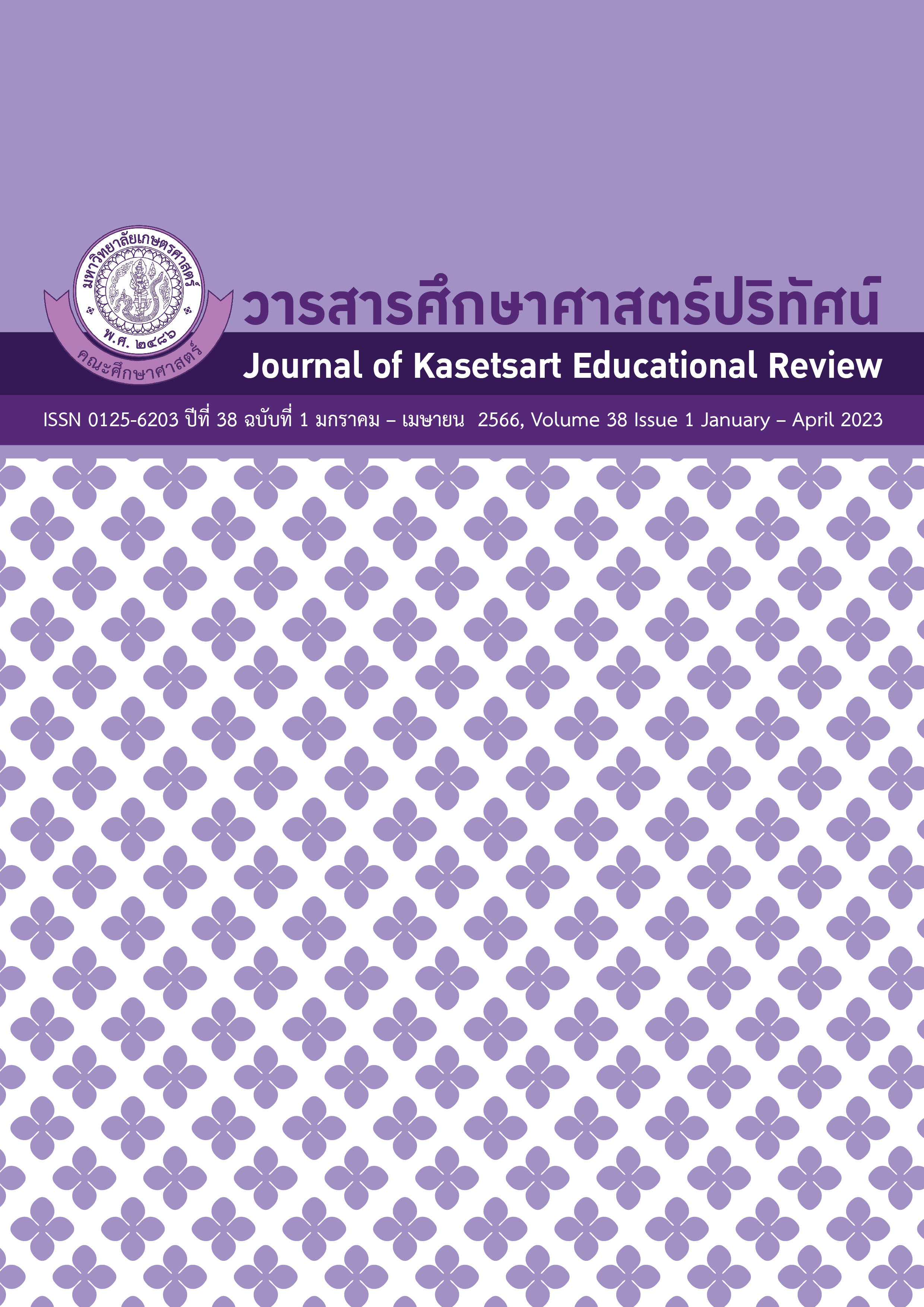กรอบความคิดเติบโต: ความเชื่อเพื่อการต้อนรับความท้าทาย และรักในการเรียนรู้ตลอดชีวิตสำหรับเด็กปฐมวัย
คำสำคัญ:
กรอบความคิดเติบโต, เด็กปฐมวัย, ความเชื่อมั่น, แรงบันดาลใจ, ต้อนรับความท้าทาย, รักในการเรียนรู้บทคัดย่อ
บทความวิชาการนี้มีวัตถุประสงค์เพื่อนำเสนอความรู้สำหรับครูปฐมวัยเกี่ยวกับความหมาย องค์ประกอบของกรอบความคิดเติบโต บทบาทครู และกิจกรรมที่ช่วยพัฒนากรอบความคิดเติบโตสำหรับเด็กปฐมวัย เพื่อให้ครูปฐมวัยสามารถนำไปประยุกต์ใช้เพื่อพัฒนากรอบความคิดเติบโตสำหรับเด็กปฐมวัยตามความเหมาะสม ซึ่งกรอบความคิดเติบโตเป็นความเชื่อที่มีต่อความฉลาด และความสามารถของบุคคลว่าสามารถพัฒนาหรือเปลี่ยนแปลงได้ โดยกรอบความคิดเติบโตสำหรับเด็กปฐมวัยนั้นสามารถพัฒนาได้จากการที่ครูปฐมวัยจัดประสบการณ์การเรียนรู้ผ่านการบูรณาการกับกรอบความคิดเติบโตที่เน้นกระบวนการ การจัดสภาพแวดล้อม การสร้างบรรยากาศ และการใช้ภาษาสื่อสารเพื่อกระตุ้นให้เด็กลองคิดหาวิธีการใหม่ ๆ มีความเชื่อมั่นในการแก้ปัญหา รวมทั้งครูปฐมวัยควรเป็นแบบอย่างของการเรียนรู้จากความผิดพลาดของตนเองได้ นอกจากนี้ครูควรเลือกกิจกรรมที่เปิดโอกาสให้เด็กได้เรียนรู้ผ่านการลงมือปฏิบัติด้วยตนเอง และให้ความสำคัญกับกระบวนการของเด็กมากกว่าผลลัพธ์ โดยพิจารณาเลือกกิจกรรมให้สอดคล้องกับพัฒนาการ และช่วงวัยของเด็กเป็นสำคัญ เช่น กิจกรรมเล่านิทานการแสดงบทบาทสมมติ กิจกรรมการประกอบอาหาร การเล่นเกม กิจกรรมการเขียนโค้ดโดยไม่ใช้คอมพิวเตอร์ เป็นต้น ซึ่งกิจกรรมดังกล่าวมุ่งสร้างแรงบันดาลใจให้เด็กเกิดความสนใจใคร่รู้สิ่งใหม่ มีความกระตือรือร้น และช่วยให้เด็กเกิดความพร้อมที่จะเผชิญกับความท้าทาย และการเปลี่ยนแปลง ซึ่งเมื่อเด็กเติบโตขึ้นก็จะสามารถเรียนรู้จากความผิดพลาดของตนเอง เนื่องมาจากการที่เด็กได้รับการปลูกฝังให้มีชุดของความเชื่อที่เหมาะสม ซึ่งจะนำไปสู่การรักที่จะเรียนรู้ของเด็ก และสามารถดำรงชีวิตในสังคมได้อย่างมีความสุข
เอกสารอ้างอิง
Anonymous. (2015). Strategies for Promoting Student Growth mindset. Arlington, VA: Hanover Research Corporate Headquarters, July, 1-24. Retrieved from http://www.drivelearning.org/uploads/4/4/1/1/44110523/strategies_for_promoting_student_growth_mindsets.pdf.
Anonymous. (2019). Brain awareness week activities. Retrieved from https://www.waterford.org/resources/brain-awareness-week-activities/.
Beidatsch, C. & Broomhall, S. (2010). Is This the Past? The Place of Role-play Exercises in Undergraduate History Teaching. Journal of University Teaching & Learning Practice, 7(1), 1–20. Retrieved from https://ro.uow.edu.au/cgi/viewcontent.cgi?article=1091&context=jutlp.
Boylan, F., Barblett, L. & Knaus, M. (2018). Early childhood teachers’ perspectives of growth mindset: Developing agency in children. Cowan University. Australasian Journal of Early Childhood, 16-24. Retrieved from https://journals.sagepub.com/doi/pdf/10.23965/AJEC.43.3.02.
Campbell, A., Craig, T. & Collier-Reed, B. (2019). A framework for using learning theories to inform ‘growth mindset’ activities. International Journal of Mathematical Education in Science and Technology. Retrieved from https://www.researchgate.net/publication/330251132_A_framework_for_using_learning_theories_to_inform_'growth_mindset'_activities.
Chesler, M. & Fox, R. (1966). Role playing methods in the classroom. Retrieved from https://files.eric.ed.gov/fulltext/ED075276.pdf
Compagnoni, M., Karlen, Y. & Merki, M. K., (2019). Play it safe or play to learn: mindsets and behavioral self-regulation in kindergarten. Metacognition and Learning, 14, 291–314. Retrieved from https://www.researchgate.net/publication/332151723_Play_it_safe_or_ play_to_learn_mindsets_and_behavioral_self-regulation_in_kindergarten.
Dweck, C. (2006). Mindset: The new psychology of success. New York, NY: Random House.
Dweck, C. (2009). Mindset: The New Psychology of Success. New York: Ballantine.
Enriquez, G., Clark, R. S. & Calce, D. (2017). Using Children’s Literature for Dynamic Learning Frames and Growth Mindsets. The Reading Teacher, 70, 711-719. Retrieved from https://www.academia.edu/34559831/Using_Childrens_Literature_for_Dynamic_Learning_Frames_and_Growth_Mindsets.
Hattie, J. (2012). Visible learning for teachers: Maximizing impact on learning. Teachers: the major players in the education process. Retrieved from https://hozir.org/pars_docs/refs/26/25322/25322.pdf.
Independent Committee for Education Reform. (2019). Thai Education Reform. https://www.thaiedreform.org/wp-content/uploads/2019/06/CommissionReport050662.pdf. [in Thai].
King, R. B. (2012). How you think about your intelligence influences how adjusted you are: Implicit theories and adjustment outcomes. Personality and Individual Differences, 53(5), 705-709. Retrieved from https://www.academia.edu/5960822/How_you_think_about_your_ intelligence_influences_how_adjusted_you_are.
Lawrence, M. & Curtis, D. (2019). Look, Listen, Learn: “We Are Power Rangers!” Learning from Children’s Dramatic Play. Naeyc. Retrieved from https://www.naeyc.org/resources/ pubs/tyc/dec2019/childrens-dramatic-play.
McLennan, P. D. (2017). Creating Coding Stories and Games. Naeyc. Retrieved from https://www.naeyc.org/resources/pubs/tyc/feb2017/creating-coding-stories-and-games.
Schroder, H. S., Dawood, S., Yalch, M. M., Donnellan, M. B., & Moser, J. S. (2014). The role of implicit theories in mental health symptoms, emotion regulation, and hypothetical treatment choices in college students. Cognitive Therapy and Research, 39(2), 120-139. Retrieved from https://www.researchgate.net/publication/266023041.
Shelby, P. & Christie, S. (2011). Preschoolers Grow Their Brains: Shifting Mindsets for Greater Resiliency and Better Problem Solving. Young Children, 30-35. Retrieved from https://www.westonschools.org/wp-content/uploads/2017/02/WW-problem_solving_8-13.pdf.
Songtiang, R. (2007). Positive thinking. Duangkaew Journal. 12(1): 69–76. [in Thai].
The National Assembly of Child and Youth Development. (2019). Innovative Thinking. Retrieved from https://www.dcy.go.th/. [in Thai].
ดาวน์โหลด
เผยแพร่แล้ว
ฉบับ
ประเภทบทความ
สัญญาอนุญาต
ลิขสิทธิ์ (c) 2023 วารสารศึกษาศาสตร์ปริทัศน์

อนุญาตภายใต้เงื่อนไข Creative Commons Attribution-NonCommercial-NoDerivatives 4.0 International License.
บทความทุกบทความเป็นลิขสิทธิ์ของวารสารคณะศึกษาศาสตร์ มหาวิทยาลัยเกษตรศาสตร์ วิทยาเขตบางเขน
วารสารศึกษาศาสตร์ปริทัศน์ (Kasetsart Educational Review)






